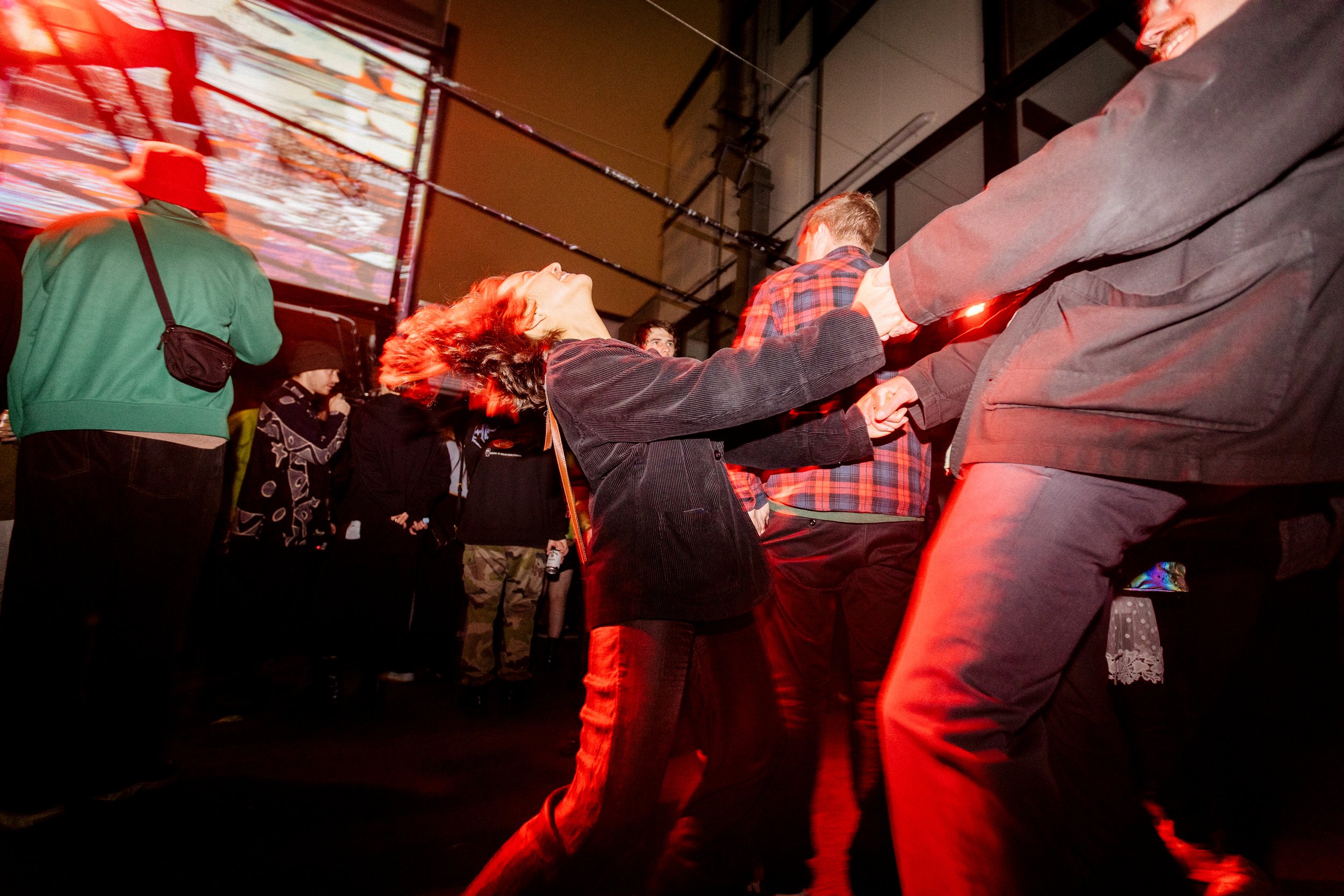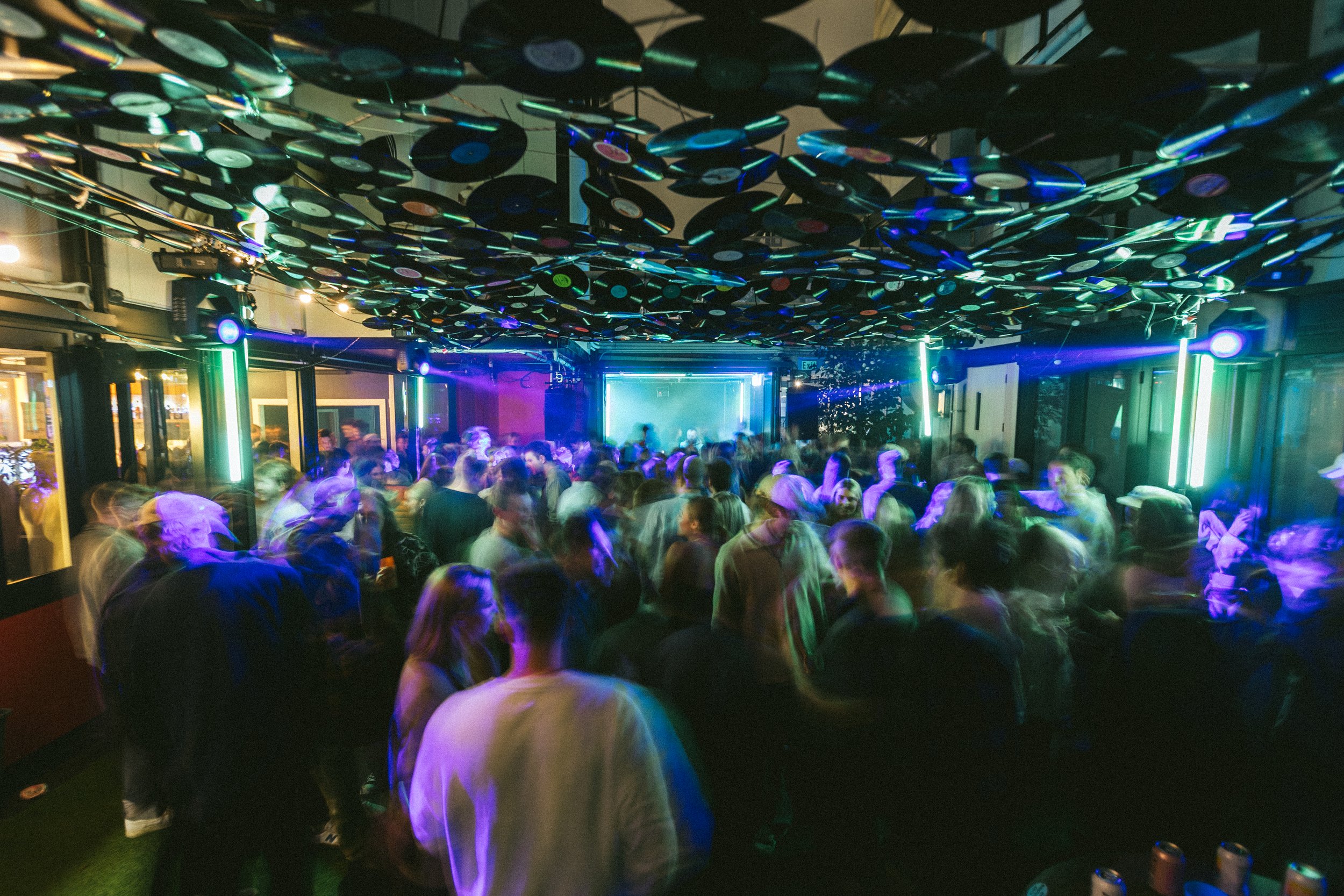Honey, We Forgot How to Rave!
Words by Ella Gibson (she/her). Images by Fran Scrimgeour.
I have been around the block and am not proud of it. And no, this is, unfortunately - to your disappointment - not a sexual innuendo. Every weekend this year, I have found myself going to multiple gigs. Before the dawning of 2022, I had been to gigs before, but nothing like this year. The dial has been turned up a notch to the point where I legitimately think that someone sprayed a FOMO solution all throughout my personal quarters.
Alas, my point here is to say that this is not my first gig rodeo. In essence, I feel confident in speaking on this topic, and you should feel confident that you’re reading something written by someone who has invested one too many brain cells in going to gigs in Ōtautahi. Gigs are a beautiful thing. They make an exquisite conglomerate that brings together facets of life that produce a truly magical concoction. Music, loved ones, boogying, being able to get silly, and expressing yourself however the fuck you like are some of the many reasons that make going to gigs an unparalleled endeavour.
While many things make gigs grand, there is also an underlying and ever-so-apparent culture that appears at some gigs, which is simply a side of humanity that neither I, nor anyone else who goes to gigs with pristine and pure intentions, enjoys.
Don’t get me wrong; I have once been an innocent fresher. We all have to start somewhere, and that place is normally with Jump Up Drum and Bass. I don’t wanna bag Jump Up anymore than necessary because it does have its place and The Upbeats’ ‘Dead Limit’ still remains my go-to treadmill track. Since then, however, we have flourished, and music tastes have naturally expanded. Thank fuck. But from having my roots planted in Breatherville, I have learned how to behave appropriately and respect my fellow ravers at gigs.
Christchurch nightclub Flux’s co-owner Finn McCall spoke on learning about gig etiquette in his early years of going out. “To be fair, it took me a few years to mature in the gig scene. I wasn’t a crazy young lad, but I certainly wasn’t really thinking about gig culture and being very considerate of everyone else,” he shared. Finn continued and talked about the realisations that one will come to about gig culture and etiquette. “It takes a long time for a lot of people to realise that it is more than just coming out and getting drunk. There is a whole community involved here [at Flux and in Ōtautahi’s gig scene], and the music is really important, and that needs to be sustainable,” Finn asserted.
Being dusty and not necessarily having the most pristine of gig etiquettes at the beginning of your gig-going days is more or less an inevitable rite of passage. You’re going to have to learn how to navigate your physiological limits (how much you can drink or take), how to conduct yourself, and what gigs you like to even go to. However, that learning experience should never have to interfere with the experiences of other gig-goers. Or in other words, one’s dusty gig etiquette should never negatively affect others. And if it does, that is when it becomes a problem.
Ōtautahi-based DJ Ponz reflected on her early days of going out. “If I think back to when I was first starting to go to gigs versus how I am going to gigs now, there is a massive difference in the way I act. I’m so much more chill about waiting in lines, and I have a lot more respect for the bouncers and the work security does to keep people safe. At first, there can be a real mentality that bouncers are out to get you, but that is 100%, not the case. They are the ones that’ll get rid of unsafe people, and it is such an important job. These are things that you only learn from experience and by watching those around you,” she shared.
Ponz also spoke on the influence that Covid and the subsequent lack of gigs had on the crowds that she performed to. “Since there’s been a couple of years without gigs, at university, in particular, I’ve started to notice that it’s almost as if there are double the amount of freshers at gigs. And it’s not because there is double the number of freshers at all; it’s because the second-year students have the same gig experience as the first years, and so ultimately, we have a larger proportion of people without proper gig etiquette, which is not their fault at all. This also means that since this proportion is larger, there are fewer people to learn from and to call other people out on for their shitty behaviour,” Ponz stated.
Antisocial behaviour can be defined as actions that harm or lack consideration for the mental conditioning of others. Sociopathy is actually a mental disorder in which an individual only has the capacity to participate and partake in antisocial behaviour. At gigs, how is this relevant? Antisocial behaviour can take up many forms at gigs, being that gigs are contrastingly an extremely social affair. Mild forms of antisocial behaviour at gigs can look like someone being obnoxiously loud and boisterous, being unaware of others’ personal space, and being on their phone. More severe forms of antisocial behaviour at gigs can appear in the forms of blatant judging of others for expressing themselves, engaging in aggressive altercations, and nonconsensual touching and harassment of others.
The gig that was the catalyst for inspiring the address of this lack of gig etiquette occurred a couple of weeks ago. Before attending this gig, I had witnessed a lot of antisocial gig behaviour before. But this one particular gig that I am alluding to immortalised the need to confront such antisocial gig behaviour. I won’t disclose what gig it was, but it was targeted at a younger adult audience in Ōtautahi. Side note, I attended the gig sober, so my observations were inescapably amplified.
Similar to what was described in Netflix’s ‘Woodstock ‘99’ documentary, there was an energy residing in the air at that gig that was anything but amicable. Alcohol had definitely been consumed in excess, the line for the gig resembled an enraged collective of Karens that were yet to be served, and respect for others was nonexistent. I saw the blockading fencing of the main entrance’s line collapse as a result of peoples’ redundant animal-like aggression. Later on, I was informed that my friend was actually swallowed up and trampled on in that line. She was okay, but obviously, that is an entirely less-than-ideal experience. In the smokers’ area, individuals attempted to climb over the glass walls after being rejected at the main entrance. They were quickly hoisted up by their collars by security guards who expelled them immediately. Then came the behaviour on the dancefloor; people were barely coherent. I became acutely aware of the daggers that were on male breathers’ eyes as they scouted the room for a cute girl to hopefully pursue. I will declare here that this is not all males. But at this gig, there was a notable and visible population of males whose intentions were not exclusively honourable. This is definitely not an exaggeration either, as the male friend that I went to the gig with was the one who pointed this out to me. All in all, this gig epitomised the indisputable lack of gig etiquette that is currently residing in some parts of our community.
I asked Ōtautahi-based DJ Foxtrot about her experiences with antisocial behaviour at gigs, and she shared the following anecdote from a recent gig that she played at. “I had a closing set. Anyone who is a DJ closing knows that 2am to 3am is a typical closing set time in New Zealand and that the crowd is not going to be the best. You’re expecting people to be leaving, and you’re expecting fucked people, but it’s fine because you know that there are a couple of people there for the right reasons,” she shared. “The gig that I was playing had a Boiler Room setup which means that the DJ is in the middle of the crowd, which makes for a great atmosphere. But there were some really drunk people. There was a group of girls standing in their dance circle that were pushing onto me while I was trying to mix. If you have ever been sober in a club, you realise how antisocial alcohol is and how drunk people have no concept of personal space,” Foxtrot asserted. She continued to say that “then, a different girl proceeded to fall over backwards and then she stood up and face planted. Later on, she was staggering around, and she leaned over the decks, and I don’t think she processed that I was playing. She scratched the jog wheel and broke a loop that I had just beat matched by ear. That behaviour was atrocious.” Foxtrot disclosed the implication that this antisocial behaviour had on her DJing and said, “it affected my focus, and it affected my mixing. I know that drunk people can be like that, but I had never had anyone fuck with the decks before.”
All of this raises the question, ‘What now, and where do we go from here?’ When chatting with Finn from Flux, he said, “Ultimately, I am glad that conversations like this are happening. I know that we should raise awareness of how people should act and kickstart that considerate mindset. Think about why you’re there and think about why they [other gig goers] might be there and immerse yourself in the community. If you’re not going to do that, maybe you need to go somewhere else that doesn’t really care for that sort of gig.”
This is about considering other people at gigs. This is about taking care and checking in with your mates. This is about calling your mates or other people out on their antisocial behaviour. This is about checking in with yourself and asking yourself how you can be a better gig-goer. This is about sustaining a fun, welcoming, and safe environment for anybody to be able to express themselves in. Finally, this is about ensuring that nobody’s safety is being jeopardised because, at the end of the day, everyone wants and should be able to have a good time at a gig.




